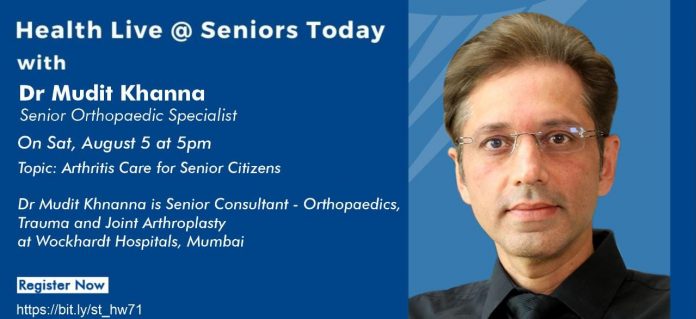Reading Time: 3 minutes
On 05 Aug, 2023, Seniors Today hosted their Weekly Live Webinar with Dr Mudit Khanna, a leading Orthopaedic Specialist who spoke on and answered questions about Arthritis Care.
About Dr Mudit Khanna
Dr Mudit Khanna is a leading Consultant – Orthopaedics, Trauma and Joint Arthroplasty (Joint replacement surgery) with the Wockhardt Hospitals, Mumbai.
Dr Khanna graduated from the prestigious King George’s Medical College, Lucknow, from where he completed both his M.B.B.S, and M.S. in Orthopaedic Surgery. Most of his higher surgical training in Orthopaedic Surgery has centred around gaining expertise in the field of joint replacement surgery in in the United Kingdom and other reputed centres across Europe, USA and Australia. While pursuing his higher surgical training in the field of Orthopaedic Surgery in the United Kingdom for a period of five years in various capacities, he completed his M.R.C.S. from the Royal College of Surgeons of Edinburgh, U.K, and M.Ch. in Orthopaedic Surgery from University of Dundee, Scotland, UK. He has worked as a Senior Clinical Fellow at the Queen Elizabeth Hospital, UK and was awarded the Asia Pacific Zimmer Fellowship, which he pursued at the renowned Cleveland Clinic, Ohio, USA. He has an expertise at performing all forms of primary and revision joint replacement cases and is a trusted name at handling complex sports related injuries requiring arthroscopic treatment.
Dr Khanna has a number of national and international publications and presentations to his credit. He is also extensively into teaching and is faculty across several training programmes aimed at aspiring arthroplasty surgeons. He has authored two highly books in the field of postgraduate studies. His work has been acknowledged by leading medical publishers including Reed Elsevier, India and Jaypee Publishers, India.
He is a member of the Royal College of Surgeons of Edinburgh, U.K. and the Indian Orthopaedic Association.
Arthritis is a very common condition and problem, with a prevalence of 7-8 people being affected by it out of every 100 people, by the time the reach 70 years of age.
As the average life span of a man increases, it becomes important that we take better care of our knees.
Arthritis is a broad term which in the most simplest way means loss of cartilage in a joint leading to inflammation.
2 commonly used terms are osteoarthritis and osteoporosis and it is important that we know the difference between the two, because these are different terms and shouldn’t be used interchangeably.
Osteoporosis means Osteo- bone; Porosis- porus ie, porous bones= weak bones, which happens as we age.
Osteoarthritis means Osteo- bone; Arthritis- loss of cartilage in the joints.
Joint is a place where two bones meet and facilitate movement.
Wherever there is a joint, 2 bones meet to help movement, there is a cushion between the two bones which surrounds these bones, which is called the cartilage. Wearing out of this cushion/ cartilage over a period of time is called arthritis.
Osteoarthritis is a term which is used when the cartilage is slightly worn out- which may happen when the people enter into their early 40s, it can however also happen at a earlier or later stage as well- as the the arthritis progresses, the cartilage progressively thins out and can eventually lead to bone on bone arthritis- where in the bone on the top starts grinding with the bone at the bottom.
The idea of delaying osteoarthritis involves primarily delaying the progression of osteoarthritis from Grade I to Grade IV.
Osteoarthritis of the knee is the most common type of osteoarthritis seen in our population.
Symptoms of osteoarthritis:
- Pain: initially, only after a period of prolonged inactivity
- Discomfort
- Deformity of the joint- usually seen in patients with Grade IV arthritis
- Ability to bear weight on the knee/ involved joint
Risk factors for arthritis:
- Age
- Female > Male
- Body weight- single most important determining factor to establish how soon you will develop arthritis and further progression of the disease
- Muscle strength
- Past injury to the joint
Preventive measure we can take:
- Maintain our ideal body weight
- Exercise regularly
- Maintain good muscle strength
- Get your injuries looked at
For loss of every kg of body weight, you are reducing 8 kgs of stress on the knee.
All existing guidelines recommend that our initial aim should be to lose 5% of whatever we weigh, provided we are overweight.
Crash diets are not advised.
It is advised that you lose 1 kg/ month.
This will allow you to lose body weight in such a way that you can maintain that weight for a much longer time and in a healthier way.
For a woman of normal height, weight loss of only 5 kgs reduces the risk of developing osteoarthritis by more than 30%.
It is estimated that substantial weight loss, such as obese to overweight or over weight to normal weight would prevent 33 % of osteoarthritis in women and 20% of osteoarthritis in men.
Weight loss is always a function and combination of diet and exercise. Diet plays a more important role than exercise in the process of weight loss.
Hint friendly exercises help delay the progression of arthritis. Stopping exercising is not the correct way to go.
In the absence of a cure, joint friendly exercises are the single most important weapon in the fight against osteoarthritis.
You need to focus on:
- Muscle strengthening exercises
- Range of motion exercises
- Standard aerobic exercises including walking
150mins / 2.5 hours of low to moderate intensity aerobic activity every week. Performed in episodes of 10-15 minutes spread throughout the week.




I felt good about this artical. I got answer of my questions. I am also suffering from arthraitis. I felt pain while walking, can’t walk properly I am 70 plus.
Comments are closed.